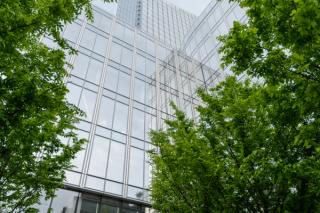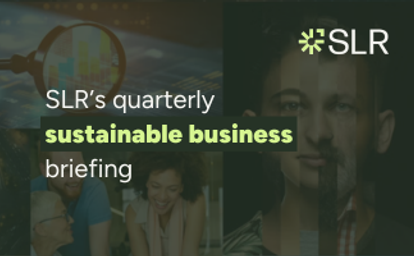
Corporate sustainability in a volatile world
- Post Date
- 21 April 2025
- Read Time
- 6 minutes

One longstanding expert reflects on the current corporate sustainability landscape – caught between political headwinds, legal challenges, and shifting ambitions – and points to the way forward.
It’s an uncertain time for corporate sustainability. In my 20+ years of supporting clients on this agenda and having seen them through the financial crash, COVID-19 pandemic, and the permacrisis that has followed, the past few months have felt different.
The change in leadership in the US has led to a volatile environment for companies not just in the US, but those facing into the US market (as Charlie and Sam illustrate so nicely in their article: All over for ESG?). Some have adjusted their ESG language and positioning, others have gone further to adjust their goals and ambition on issues such as decarbonisation and diversity and inclusion.
In Europe, the European Commission finds itself caught between its mandate to a sustainable and prosperous economy and the drive towards competitiveness and regulatory ‘simplification’. The resulting proposals for the Omnibus legislation package have created real uncertainty for key pieces of sustainability-related regulation and companies’ plans to comply.
These political developments follow signs of a shifting and softening of sustainability ambition in recent years. Between anti-ESG, anti-woke sentiment and accusations of over-claiming, greenwashing, and purpose-washing, companies have been caught between doing too much or too little, struggling to navigate a way forward.
Changing corporate sustainability ambition
One company in the spotlight is Unilever, 15 years on from the launch of its ground-breaking Sustainable Living Plan. In 2010, this plan set the gold standard of leadership in sustainability. The goals were lofty, perhaps unrealistically high, but based on the case that this was the only right outcome for the planet and for people. Unilever acknowledged the gaps in its ability to deliver, and at the time, this was applauded. Pointing at the systemic nature of so many of the barriers to sustainability, the company set a challenge for all stakeholders to collaborate to find solutions.
Today’s zeitgeist couldn’t be more different. Not only is there less patience among stakeholders for extravagant goals without a clear path forward, there is also huge mistrust.
We have seen growing legal action against companies for sustainability claims. In February 2025, a landmark legal challenge from ClientEarth compelled Danone into greater transparency on plastics. Airlines such as KLM and Delta have faced legal action for their climate claims. H&M [1] was sued last year for misleading marketing on the sustainability credentials of its products. A recent study [2] by the Grantham Research Institute on Climate Change and the Environment at the London School of Economics found that the number of climate cases filed against companies reached 230, as of June 2024. Of these, 140 were cases accusing companies of ‘climate-washing’.
As a result, companies are thinking carefully about the types of targets they set, scaling back to what is realistic and achievable. In itself this is not a bad outcome, but the room for companies to set stretch objectives and be more ambitious has narrowed.
Focus on the business case for sustainability
Aside from leadership on targets, companies have been keen to demonstrate the win-win of sustainability. In many cases companies have successfully argued that environmental efficiency delivers cost savings, talent flocks to inclusive companies, and that brands with ‘purpose’ show faster growth.
However, this business case too has come under challenge.
Some investors are not only difficult to persuade, but openly skeptical. Activist investors in particular have doubled down on shareholder primacy. Business leaders are being urged to sharpen their focus, rather than spreading themselves too thin across the sustainability agenda.
Will regulation fill the gap?
Many argue that change at the scale needed can only be delivered by government. Raising the bar for all companies levels the playing field and can deliver the right conditions for individual company action.
However, even here, my LinkedIn feed shows a huge amount of concern on the direction of travel.
The EU Commission’s Omnibus proposal reduces the scope of companies that come under the EU’s Corporate Sustainability Reporting Directive. While the directive was not perfect, it did focus the attention of a large number of companies on their sustainability impacts, risks and opportunities. The Omnibus also proposes a scaling back of the Corporate Sustainability Due Diligence Directive, which aimed to tackle the hidden environmental and human right impacts in company supply chains.
The way forward for corporate sustainability
Against a litigious and politically uncertain backdrop, with a tougher investor audience, and the regulatory stick losing its momentum, how do companies continue to steer their sustainability efforts forward?
It was values and purpose that propelled the first generation of sustainability leaders forward. And these remain key motivators for many, including many customers. Most want to see companies acting responsibly and an appreciable minority offer a ‘sustainability premium’.
A sharper focus on where sustainability drives real business value is also key. Businesses that make the effort to understand the complex interaction of critical sustainability issues with their business model will be the most resilient to volatility in the external landscape.
Thirdly, a new generation of leaders that strongly believe that long-term successful businesses are sustainable businesses will be needed to drive change.
While this feels like a moment of huge uncertainty, it can’t ultimately turn the tide on years of dedicated effort and action. The good news is that this new generation of leaders is emerging, there is a growing set of investors that also take this viewpoint, and employees will continue to push for change from the inside.
Advisory Digest
Enjoyed this article? For more like it, get SLR's quarterly sustainable business briefing straight to your inbox.
Sign up
----------------------------
References
[2]https://www.lse.ac.uk/granthaminstitute/wp-content/uploads/2024/06/Global-trends-in-climate-change-litigation-2024-snapshot.pdf
Recent posts
-

-

-

Understanding sound flanking: Fire alarm speaker cable conduits in multi-family buildings
by Neil Vyas
View post